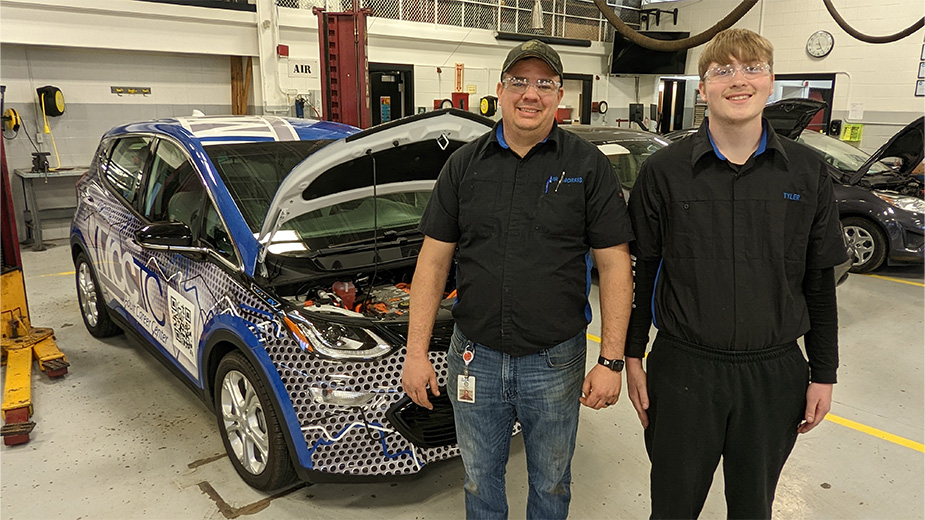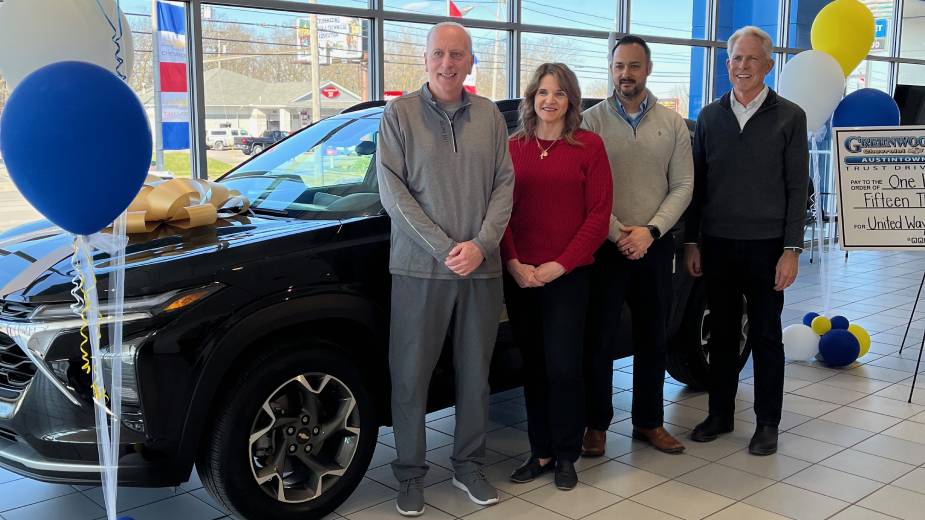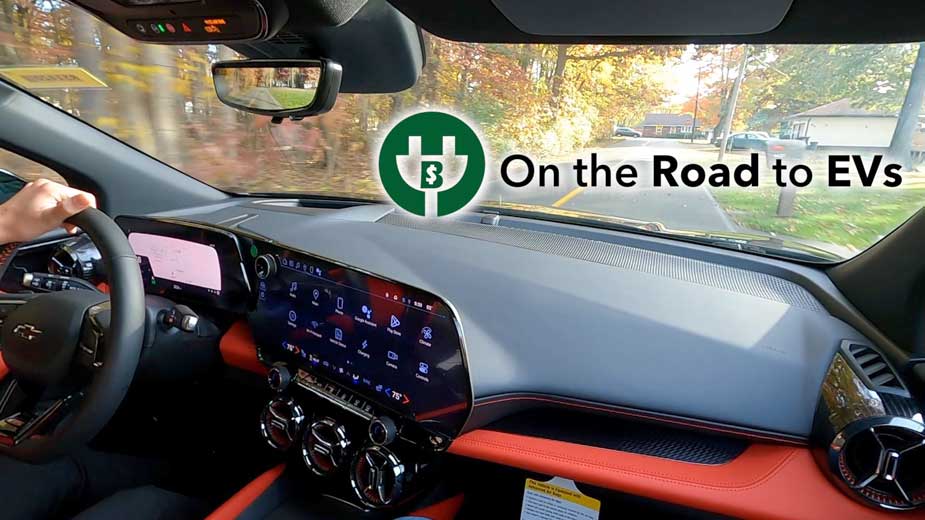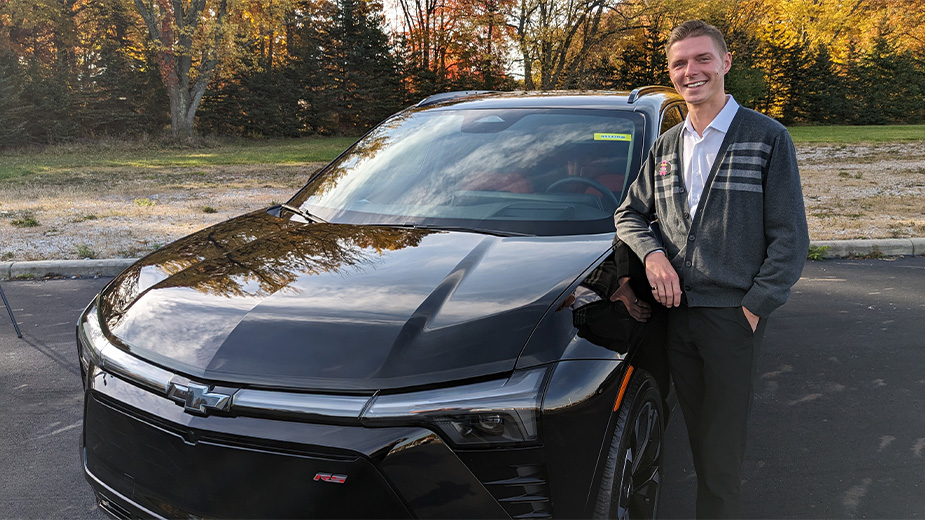Valley Students Prepare for an EV Future
YOUNGSTOWN, Ohio – Tyler Opritza, a junior at Struthers High School and a student enrolled at Mahoning County Career & Technical Center, is excited about his future.
He’s especially enthusiastic about a career in the electrical vehicle segment, as the automotive technology major prepares for a transition that’s going to dominate the industry in the coming years.
“I think the EVs are going to take over,” Opritza said. “I think there’s going to be a lot of opportunities for people.”
Opritza is still in the early stages of MCCTC’s auto tech program, and he’s not yet worked on EVs. However, he’s eager to do so. “I’ve driven them, but I’ve never worked on one. I’d like to.”
At this point, Opritza and other students at his grade level are learning the automotive fundamentals – brakes, tires and other mechanical components used in internal combustion engines. EVs, he noted, will still need to replace tires and brakes.
Next academic year, as a senior, Opritza will tackle more complex electrical studies that will introduce some basic understanding of EVs and how they work.
“I think they’re cool – something of the future,” Opritza said. I think EVs run better, and they’re healthier overall for the environment. My goal is to work on them.”
Students at MCCTC, however, aren’t prepared to tackle hands-on the intricacies of electric vehicles just yet, said Thomas Morris, automotive technology instructor at MCCTC. “We’re going to be teaching the kids about safety and how to work around them. They’re not going to tear them apart or anything – that’s too dangerous.”
Still, the senior-level course will introduce students to the basics of electronics and how it relates to EVs and vehicles in general. “Everything on vehicles – EVs or otherwise – is controlled by some sort of electrical component,” Morris said.
MCCTC currently has two EV models in its shop, a Chevrolet Bolt and a Kia EV 6, Morris said. These models are used to demonstrate firsthand how these vehicles operate and some of the major differences between EVs and gas-powered engines.
None of the students will be working directly on those vehicles because of safety concerns, Morris cautioned. “This is still in its infancy,” he said. “We’re looking through curriculum and specific EV training. I’m looking for additional training myself.”
Currently, Morris’ class consists of 17 juniors and nine seniors. Ten juniors are signed up for the next academic year, he said.
Students will receive hands-on training in working with and learning how to install new electric-vehicle charging stations, said John Zehentbauer, superintendent of MCCTC.
In October, MCCTC broke ground on a $1.1 million Innovative Energy and Technology Workforce Training Center where both high school students and adults can train for local careers in the electrical industry, he said. A portion of the new center will be devoted to EV charging.
“Our electrical kids will learn and how to install and maintain these charging stations,” he said. “We’re also hoping to educate the public – it’ll be a place to show them different types of chargers and the installation and what it would cost on the other end of owning an electric vehicle.”
Zehentbauer said the center would be used for Valley STEM ninth and 10th-grade students, as well as the 11th- and 12th-grade MCCTC students. It would also augment programs for adult learners and those receiving training in conjunction with area businesses and manufacturers.
The objective is to have the building ready by next fall.
MCCTC’s electrical instructor, Kory Cooper, said students would first be trained on how to install and repair residential and commercial EVs.
“It’s about introducing young people to the technology,” he said.
The electric backbone for EV chargers is similar to any other wiring job, Cooper said. What is different is the electrical discharge from the station into the vehicle. “The secondary part is what’s different – that’s going to be the teaching piece,” he added.
Residential chargers are mostly Level 1 and Level 2 stations, Cooper said. Level 1 chargers are used with standard 120-volt outlets but could take up to 20 hours to fully charge a battery. Level 2 chargers require between a 208-volt and 240-volt power source yet are able to charge a vehicle on average eight times faster than a Level 1, depending on the type of vehicle.
Level 3 chargers, often referred to as DC fast chargers, are almost exclusively used for commercial purposes. These stations can charge on average between 60% and 80% of an EV battery in approximately 30 minutes.
“We’re going to do all three classes of EV chargers and give them an overall background on what they look [like] for residential and commercial applications,” Cooper said. “We want to give them a more well-rounded education on what they might see.”
MCCTC has two EV chargers in the shop, Cooper said. The new tech center will house three different brands of chargers.
Cooper’s electricity class consists of 22 seniors and 27 juniors, and he estimates more than half of them are interested in EVs. “Some of them are actually driving their family’s car, which is an EV, and are coming in with questions all the time.”
Once students complete their introductory work at schools such as MCCTC, some will transition to post-secondary training in the automotive tech sector.
Mike Conway, chairman of the automotive transportation department at Stark State College in Canton, observes that his program receives a “handful” of students from MCCTC pursuing certification.
“Right now, we’re working primarily on hybrids,” Conway said, noting the safety protocols for EVs are similar to hybrids. The EV has a larger battery pack than a hybrid, but their voltage ranges are fairly close to each other, he noted.
Conway said that among the department’s programs is the General Motors Automotive Service Education Program, or ASEP. “The classes are specialized in GM products,” he said. “As they go through the program, they are also earning manufacturers certification in those areas.”
Once these students graduate, Conway said they’re approximately 70% trained toward becoming a GM certified technician, part of which is some EV training, he said.
However, most of the manufacturers want these technicians to train through their specific factory training before they are able to work on high-voltage EVs, Conway said.
Stark State’s automotive technology program, however, does include an alternative fuel and hybrid component that covers how these vehicles are built and explores their operational characteristics.
That program also emphasizes safety training, Conway said. “When you get into the high-voltage systems, you have to make sure that you have high-voltage gloves, safety glasses – sometimes some additional personal protection that you’ll have to have on as well,” he noted.
However, the program goes further in that it allows students to perform component identification and testing, he said.
“There’s a little bit of on-vehicle service in that class,” Conway said. “It prepares these students to go out and work around these vehicles. Our goal is that our graduates become the master techs in the shop” and work on EVs and other alternative fuel vehicles safely.
Most entry-level technicians aren’t performing battery electric service, Conway said. “But we want our folks to be prepared to do that.”
The industry’s transition to EVs has already begun, and electric vehicles are only going to become more prevalent over the next decade, Conway added. That means higher demand for technicians who possess the skill sets in the hybrid and EV space.
Conway said enrollment stands at 130 in the automotive transportation department, some of which are enrolled in specialized manufacturers programs through GM, Honda and Toyota. “The most popular is our automotive technology comprehensive program,” he said.
Often, dealerships will partner with the college to send technicians to improve their skill sets, Conway said.
The GM program, for example, includes an internship component where the students come to school for eight weeks and then work at a dealership for eight weeks each semester, Conway noted.
“By the time they get through the two-year program, they earn an associate degree, they get 70% trained as a GM master technician and they also have a year work experience under their belt.”
The overall objective is to develop a skilled workforce that is able to address the oncoming EV market, Conway said. Most of the graduates from Stark State’s programs often take jobs at dealerships, though some have found employment in fleet maintenance or retail service.
“There’s always that concern that there’s going to be enough talent to take care of even the vehicles we have today, let alone electric,” he said.
Pictured at top: Thomas Morris, left, automotive technology instructor at Mahoning County Career & Technical Center, and Tyler Opritza, an automotive technology student at the center.
Copyright 2024 The Business Journal, Youngstown, Ohio.



